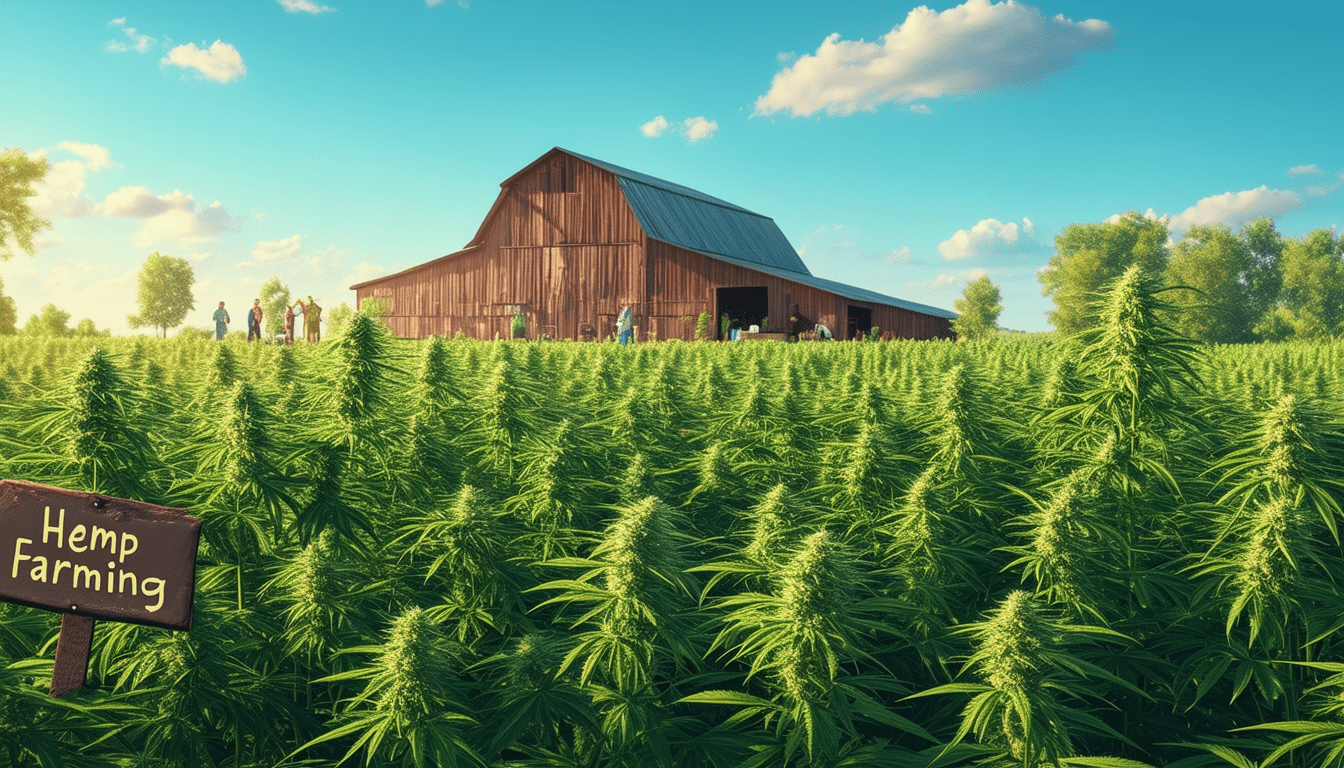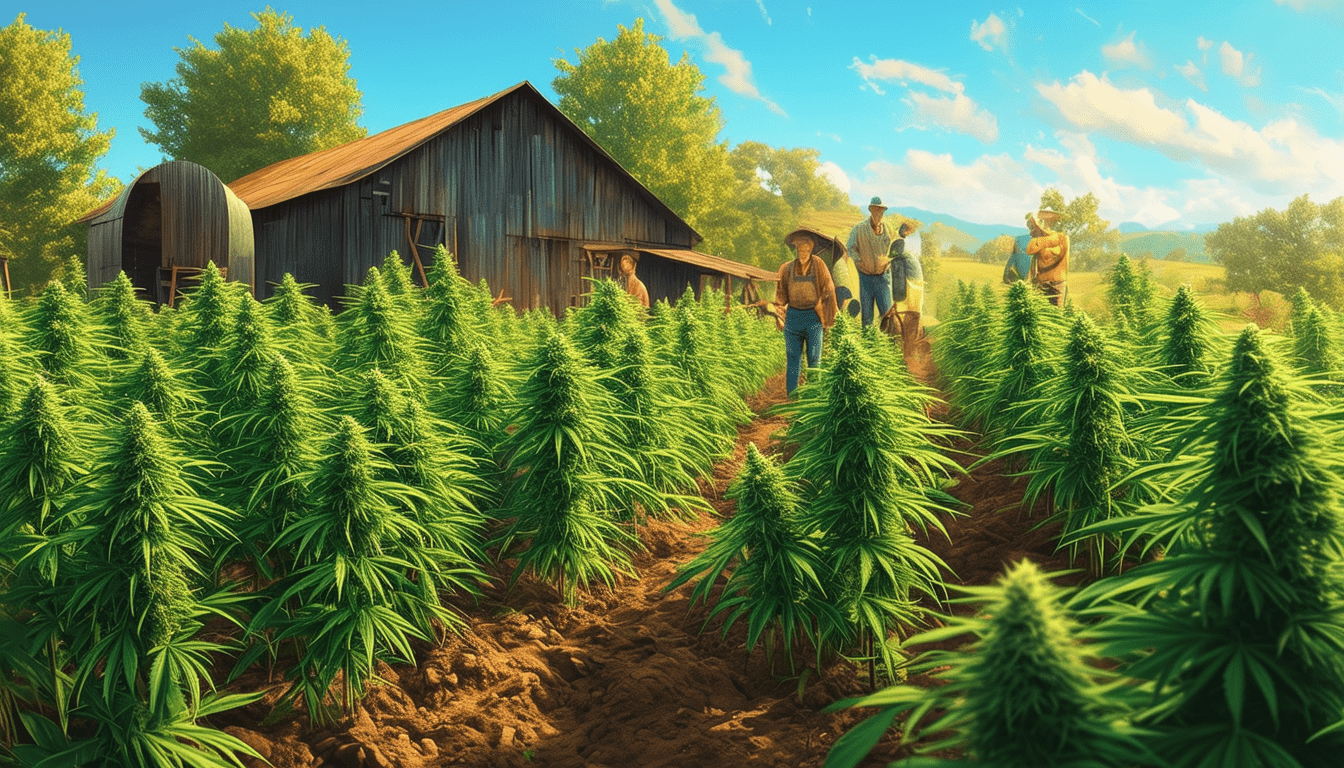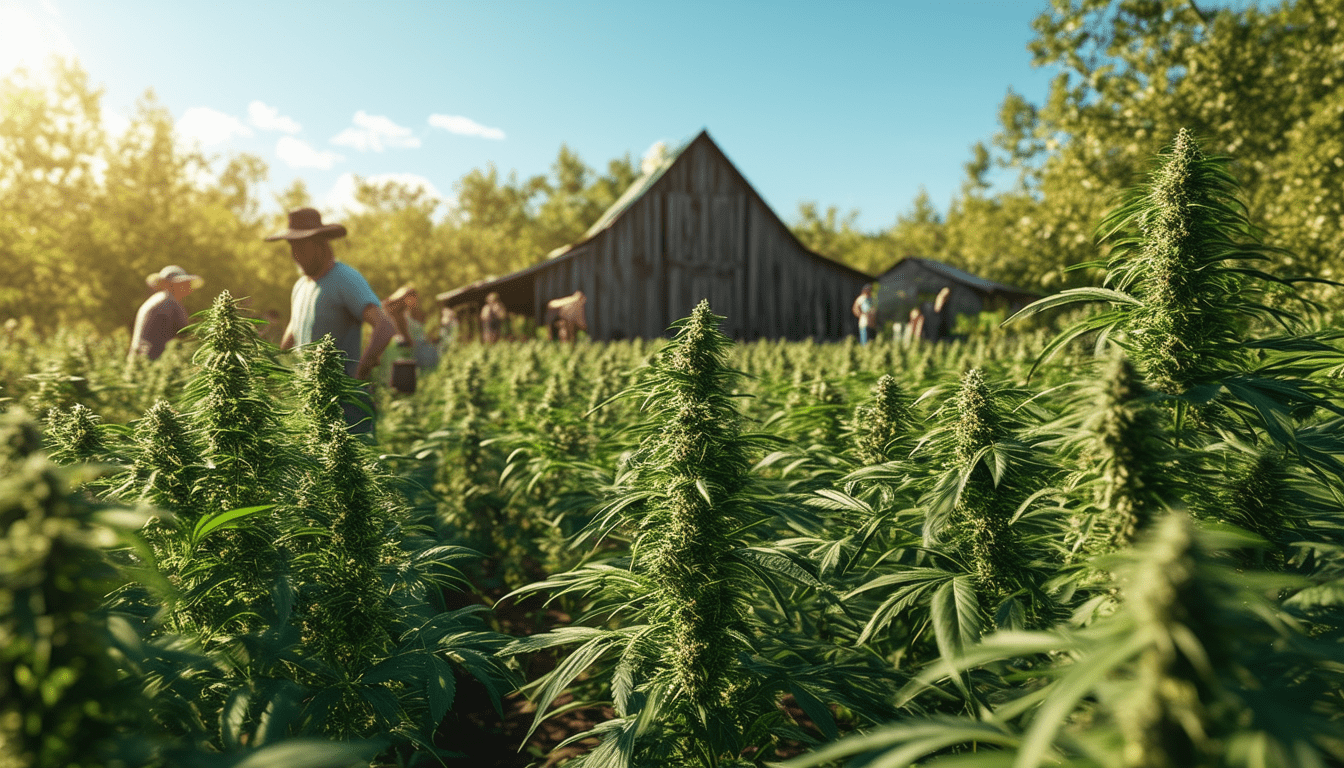Hemp farming: understanding its benefits and challenges
|
IN BRIEF
|
Hemp farming has experienced a resurgence in recent years, positioning itself as a cornerstone of sustainable agriculture. As farmers and investors explore this versatile crop, they are drawn to its numerous environmental benefits, including soil enhancement and carbon sequestration. However, the journey is not without its challenges. From regulatory hurdles to the risks of cross-pollination and maintaining THC levels, understanding the intricacies of hemp cultivation is essential for those willing to navigate this evolving industry. The renewed legal status of hemp farming in various regions has opened the door to economic opportunities, making it imperative to weigh both the potential rewards and inherent risks.

Hemp farming is an increasingly relevant topic within the context of sustainable agriculture, as this versatile crop offers numerous advantages while also posing significant challenges. This article delves into both the benefits of hemp cultivation—such as its environmental impact and economic potential—and the challenges faced by farmers, including regulatory hurdles and issues related to cultivation practices.
The Environmental Benefits of Hemp Farming
One of the most compelling reasons to consider hemp farming is its substantial environmental benefits. Hemp is known for its ability to improve soil health, suppress weeds, and reduce the need for chemical fertilizers. This crop is a natural carbon sink, which means it absorbs CO2 from the atmosphere, effectively helping to mitigate climate change. Additionally, its deep root system contributes to soil integrity, making it a sustainable option for agriculture, especially in rotation with other crops. As discussed in various studies, the incorporation of hemp into farming systems can lead to improved soil structure and health, paving the way for more sustainable farming practices source.
Economic Opportunities in Hemp Cultivation
The legalization of hemp production in regions like the United States has opened up new economic opportunities for farmers. Hemp can be used for a plethora of products, ranging from textiles to construction materials and food supplements, thereby diversifying revenue streams for growers. The market for CBD, derived from hemp, is particularly lucrative, capturing the attention of both consumers and businesses alike. As evidenced in recent discussions on the changing landscape of agriculture, the potential economic benefits of hemp cultivation are vast and varied source.
The Challenges of Hemp Farming
Despite its numerous advantages, hemp farming is not without its challenges. One significant hurdle for hemp farmers is the risk of cross-pollination from wild hemp or other crops. This can lead to unexpected variations in crop quality and cannabinoid levels, which may affect overall yield and profitability. Additionally, navigating the complexities of regulations surrounding hemp cultivation presents another layer of difficulty. Farmers must stay informed of local and national laws, which may change swiftly and often vary significantly from one region to another source.
Understanding Hemp Agronomy and Cultivation Practices
To successfully cultivate hemp, farmers must familiarize themselves with essential hemp agronomy practices. These include understanding specific hemp varieties, managing soil nutrients, and preventing pest infestations. Although advancements in agricultural sciences provide robust guidance, questions remain about optimal cultivation methods, particularly concerning keeping THC levels within allowable limits while maximizing CBD yield. Regulatory requirements surrounding THC content add an additional challenge, complicating the farming process and potentially influencing market viability source.
The Future of Hemp Farming
As the hemp industry continues to evolve, the opportunities and challenges will likely shift as well. Increased interest in sustainable agricultural practices and organic farming methods can lead to further advancements in hemp cultivation. However, continuous attention to regulatory compliance and market fluctuations will be crucial for farmers looking to enter or expand their presence in the hemp market source.
| Aspect | Description |
| Environmental Impact | Hemp requires fewer pesticides and fertilizers, promoting sustainable farming. |
| Economic Opportunities | Re-legalization has opened new markets for products like CBD and fibers. |
| Cross-Pollination Risks | Outdoor farming faces challenges due to potential cross-pollination with wild hemp. |
| Regulatory Challenges | Different legislative frameworks exist that can affect farming practices. |
| Crop Yield | Growing specific varieties can make it hard to balance yield and THC levels. |
| Production History | Hemp has a long history but faces modern market challenges in adaptation. |

Hemp farming has resurfaced as a significant agricultural practice, offering a myriad of environmental benefits and economic opportunities. However, this ancient crop also comes with its own set of challenges that farmers must navigate. This article delves into the benefits of hemp cultivation, as well as the hurdles faced by those looking to integrate it into their farming operations.
Environmental Benefits of Hemp Cultivation
One of the standout advantages of hemp farming is its positive impact on the environment. Hemp is known for its ability to grow rapidly, utilizing soil nutrients effectively, thereby helping to restore depleted soils. Furthermore, it requires fewer pesticides compared to traditional crops, making it a more sustainable choice for farmers looking to reduce their ecological footprint. Additionally, hemp plants can absorb significant amounts of carbon dioxide, contributing to climate change mitigation. For more details on the environmental impact of industrial hemp, refer to this comprehensive review here.
Economic Opportunities in Hemp Production
As the legality of hemp farming increases, particularly in countries like the US, farmers are discovering new economic opportunities that were once inaccessible. Industrial hemp can be used in a variety of products, including textiles, construction materials, and health supplements like CBD oil. This diversification allows farmers to tap into different markets, potentially increasing their profit margins. Additionally, the growing interest from consumers in sustainable and bio-based products creates a favorable market for hemp farmers.
Challenges Facing Hemp Farmers
Despite its advantages, the journey of hemp cultivation is not without its challenges. One significant hurdle is the risk of cross-pollination from wild hemp varieties. This can lead to THC levels exceeding the legal limit, posing regulatory issues for farmers attempting to produce high-cannabinoid products. Moreover, the current lack of comprehensive legislation surrounding hemp farming can create confusion regarding compliance and best practices, further complicating production efforts. Farmers must stay well-informed of both local regulations and scientific advancements in hemp agronomy to combat these challenges effectively. For an overview of production practices, check out this resource here.
Adapting to Regulatory Landscape
Farmers venturing into hemp cultivation must also contend with a variable regulatory landscape. As more countries develop legislation regarding hemp farming, it is crucial for farmers to stay abreast of changes that might impact their operations. Regulatory compliance is essential for ensuring product quality and market access; understanding the evolving legislative framework is vital for anyone looking to enter this industry.
While hemp farming presents exciting opportunities, it requires keen awareness of both its benefits and challenges. Farmers interested in this versatile crop must balance potential profitability with the complexities of environmental impact and regulatory compliance.
- Benefits of Hemp Farming
- Environmental Sustainability: Hemp requires less water and pesticides
- Economic Opportunities: Creation of jobs and new markets
- Diverse Applications: Used for textiles, biofuels, and CBD production
- Soil Health: Enhances soil quality and reduces erosion
- Environmental Sustainability: Hemp requires less water and pesticides
- Economic Opportunities: Creation of jobs and new markets
- Diverse Applications: Used for textiles, biofuels, and CBD production
- Soil Health: Enhances soil quality and reduces erosion
- Challenges of Hemp Farming
- Cross-Pollination: Risks of wild hemp affecting CBD yield
- Regulatory Uncertainty: Varying legislation across regions
- Market Challenges: Price volatility and demand fluctuations
- Knowledge Gap: Need for improved agronomic practices and research
- Cross-Pollination: Risks of wild hemp affecting CBD yield
- Regulatory Uncertainty: Varying legislation across regions
- Market Challenges: Price volatility and demand fluctuations
- Knowledge Gap: Need for improved agronomic practices and research
- Environmental Sustainability: Hemp requires less water and pesticides
- Economic Opportunities: Creation of jobs and new markets
- Diverse Applications: Used for textiles, biofuels, and CBD production
- Soil Health: Enhances soil quality and reduces erosion
- Cross-Pollination: Risks of wild hemp affecting CBD yield
- Regulatory Uncertainty: Varying legislation across regions
- Market Challenges: Price volatility and demand fluctuations
- Knowledge Gap: Need for improved agronomic practices and research

Understanding Hemp Farming: A Double-Edged Sword
The resurgence of hemp farming has sparked intense discussions about its numerous benefits and inherent challenges. As this versatile crop gains legal footing in various regions, interest continues to grow on how it can be utilized for environmental sustainability, economic growth, and various industrial applications. However, while the benefits are compelling, a careful examination reveals significant challenges that farmers must navigate to tap into the full potential of hemp cultivation.
Benefits of Hemp Farming
Environmental Sustainability
One of the primary advantages of hemp farming is its potential for environmental benefits. Hemp is known for its ability to absorb carbon dioxide, making it an excellent crop for combating climate change. Moreover, hemp requires less water to grow compared to traditional crops like cotton, which can significantly reduce water consumption in agriculture. Additionally, its deep roots help in preventing soil erosion and improving soil health, leading to more sustainable agricultural practices.
Diverse Applications and Economic Potential
The versatility of hemp cannot be overstated. It can be processed into a wide range of products, including textiles, bioplastics, and biofuels. This diversity opens up new economic opportunities for farmers. As industries seek to transition to more sustainable practices, the demand for hemp-based products is expected to increase. Furthermore, hemp seeds and extracts, particularly those rich in CBD, present lucrative markets that can significantly boost farmers’ incomes.
Challenges in Hemp Farming
Regulatory Hurdles
Despite the promising benefits, the journey into hemp farming is not without its complications. The regulatory landscape surrounding hemp cultivation varies significantly between regions, creating confusion and uncertainty for farmers. For instance, strains that produce high levels of CBD must be carefully managed to ensure THC levels remain within legal limits. These regulatory challenges can lead to disruptions in production and negatively impact farmers’ ability to operate sustainably.
Pest Management and Cross-Pollination
Another significant challenge lies in the management of pests and the threat of cross-pollination from wild hemp varieties. Farmers cultivating CBD-dominant varieties must remain vigilant, as cross-pollination can lead to decreased potency and compromised quality of their crops. The presence of nearby wild hemp can complicate pest management strategies, highlighting the need for robust agricultural practices and possibly protective measures to outweigh these environmental threats.
Shortcomings in Research and Education
While the hemp industry is experiencing growth, there remains a lack of thorough research and resources devoted to optimizing hemp agronomy. Farmers often face challenges in understanding the best practices for planting, cultivation, and harvesting. There is a pressing need for improved agricultural education focused specifically on hemp, which can empower farmers to make informed decisions and capitalize on the crop’s full potential.
The Future of Hemp Farming
As hemp farming continues to gain traction, it will be crucial for stakeholders—ranging from farmers to policymakers—to address the challenges that accompany it. Fostering an environment that promotes research, reinforces supportive regulations, and educates farmers will be pivotal in ensuring the success and sustainability of this promising crop. The evolution of hemp farming is a testament to how traditional crops can find new relevance in modern agricultural landscapes, balancing both ecological responsibility and economic viability.


Post Comment